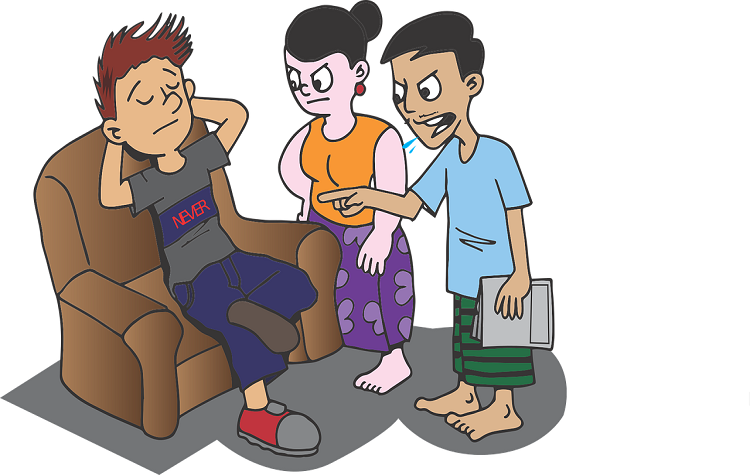Parenting is not about techniques, it is about understanding children and guiding them accordingly towards their journey of becoming a responsible adult. Often rather than guiding, parents tend to rule their lives. In their zeal to protect their children, they unknowingly harm them.
Given below are seven reasons why we believe there should be a school for parents. There is a need to understand the difference between over-parenting and under-parenting; being authoritative and submissive – because somewhere between these extremes, lies the definition of a good parenting.
1) No idea about their goal for children
“First thing that parents should ask themselves – what do you want for your child? Merely saying, ‘I want the best for my child’ is not enough. What exactly is your goal? Do you want your child to be happy or not? Do you want him to become a responsible, independent person or always dependent on others? Think about your goals. Focus on our destination, then find out ways to do it,” said Sushant Kalra, Founder, Parwarish Institute of Parenting.
2) Limiting the creativity and freedom of their children
If you observe children, they are happy, inquisitive, fearless, loving, stress-free and imaginative. We all were born this way. Parents need to nurture these qualities, but they are unknowingly damaging them. If a child is not eating food, they tell him, ‘eat else baba will come.’ And unknowingly, instill a sense of fear in a toddler. Similarly, parents often say to their kids, ‘Study now. Your exams are approaching.’ This leads to introduction of fear and stress in the lives of students. It is important that as a parent, you understand the repercussions of your actions in the longer run.
3) Losing cool when a child becomes irrational
“When a child starts crawling, we often keep a toy at a distance for him to crawl and pick it up. Once the child reaches the destination, we pick up the toy and place it further away from the baby. The baby looks at us, smiles and starts the journey again. We repeat it again and again and the baby responds smilingly at us. Ever wondered, what would be our reaction if someone behaved with us like this? We will lose our temper and shout at a person,” explains Kalra. How often do parents yell at their children when their actions irritate them? Go to a mall, and you would often find parents shouting at their kids and telling them to behave properly. Dictionary defines a child as ‘an immature or irresponsible person’. They are meant to behave that way but shouldn’t a parent’s reaction be mature and responsible?
READ ALSO: Five common myths about parenting
4) Strained relationship between parents and children
In the last 2-3 decades, the society has progressed in almost every sector – people have more money, better cars, students are scoring more marks – but the relationship between parents and students have become difficult. Also, as children enter their teens, the relationship becomes argumentative in nature. More than the generation, it is the communication gap between the two that leads to strained relationships. Thus, the challenge before parents is figure out how to communicate with their children so that they get to know their world. As Kalra puts it, “Parents job is similar to doctors. The latter first diagnoses a problem before treating it. Similarly, parents need to find out what is troubling the child. For example, if a child’s inquisitiveness is going down, they should try to find out why it is going down and then treat it accordingly.” He further suggests that parents should sit with their children and set common goals and then all of them should work towards achieving them. This way there will be less conflict at home.
5) Children are stressed
Every day, newspapers carry reports about suicides committed by students because they were unable to cope with stress. Often the stress is because of high expectations of parents from their children. When parents pressurize their children to achieve good grades, they sow the seeds of stress and poorer well-being, says the study, “When mothers and fathers are seen as disproportionately valuing achievements: Implications for adjustment among upper middle class youth,” published in the online edition of the Journal of Youth and Adolescence. Deepti Arora, who teaches higher secondary students in Ramjas School, agrees, “Parents need to change their mindset regarding the behaviour of children. They are expecting too much from children.”
6) Parenting style inspired by their childhood experience
We are exposed to parenting right from our childhood. Based on the way our parents treated us, we subconsciously decide what a good parenting practice is and what is not. When we become parents, we ensure that we do not subject our children to practices that we disliked as a child, often forgetting that it is not necessary that our children will feel the same way as we did. It is important to realize that every individual is different and so are his reactions to every situation. While parents don’t want bad for their children, they seldom realize the impact of their parenting on their wards. Hence, techniques that worked for us may not work for our children and vice versa.
YOU MAY LIKE TO READ: Being parents – Not an easy job
7) Not ready to learn parenting, or evolve as a parent
Let’s accept it. Parents are not God. They too can make mistakes. Parents should be open to learning, experiencing, experimenting. They should give up authoritative thinking (parenting of the type where parents are always right and a child cannot question them) or submissive attitude (parenting style where parents fulfill every demand of their child). Both are harmful. They need to understand that they too can make mistakes, and thus should be willing to evolve as a parent.
Do you feel strongly about something? Have a story to share? Write to us at info@thepeepertimes.com or connect with us on Facebook or X (Twitter)



